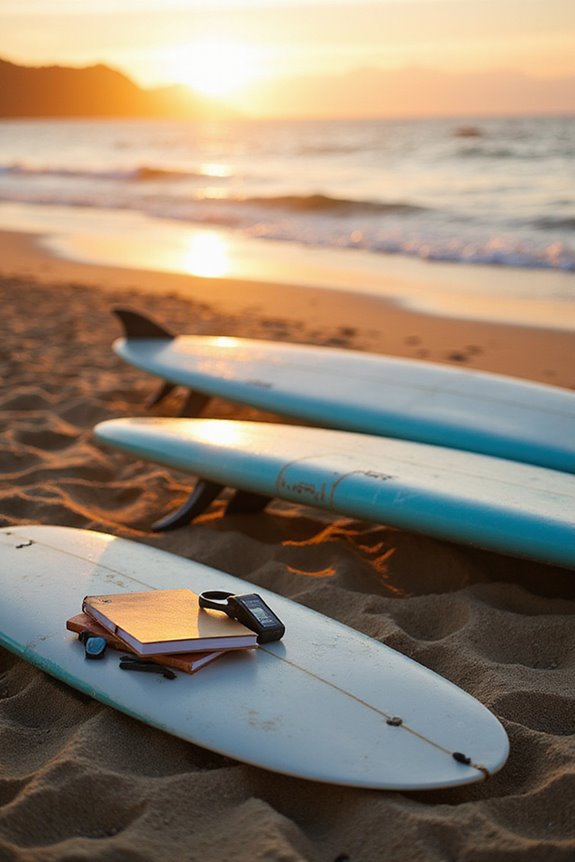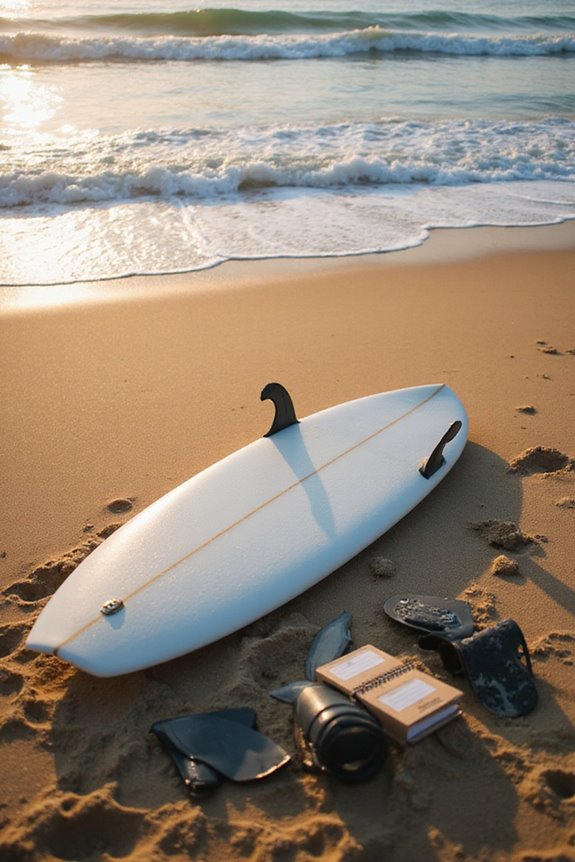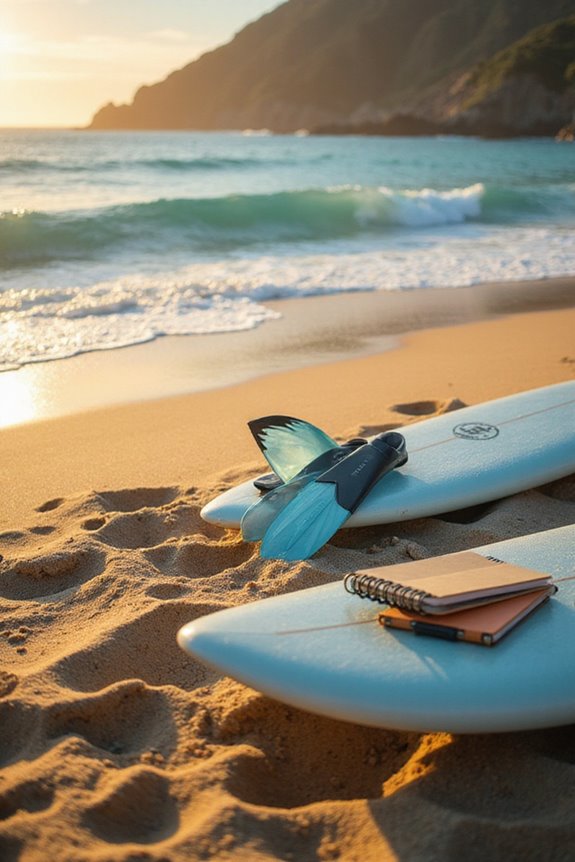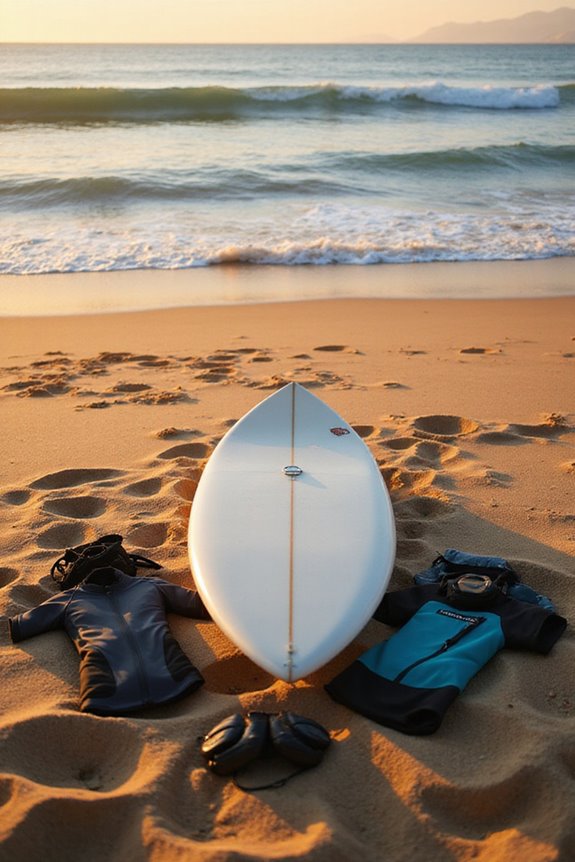To deal with surfing anxiety, we can start by gradually exposing ourselves to our fears. This means beginning with lower-intensity experiences, like watching from the shore. We’ll also benefit from mindfulness techniques, such as deep breathing exercises and visualization to prepare for tough waves. Building a supportive surf community aids in sharing experiences and fostering connections. Setting realistic goals can keep us focused on our progress. There’s much more we can explore about managing anxiety effectively.
Key Takeaways
- Gradually expose yourself to surf conditions, starting with low-intensity experiences to build confidence and reduce anxiety over time.
- Practice mindfulness techniques, such as deep breathing exercises and visualization, to stay present and manage anxious thoughts effectively.
- Set realistic goals by breaking down larger objectives into smaller, achievable steps tailored to your current skill level.
- Engage with a supportive surf community or surf therapy programs to share experiences and foster connections with fellow surfers.
- Spend time in nature to enhance your mood and promote calmness, which can help alleviate anxiety related to surfing.
Understanding Surfing Anxiety
When we think about surfing anxiety, it’s important to recognize that it can affect anyone, regardless of experience. This anxiety often arises from specific surfing triggers, such as big waves, unfamiliar locations, or crowded waters.
The symptoms can vary widely and may include heart palpitations, trembling, shortness of breath, and dizziness. These anxiety symptoms can feel overwhelming and may even mimic a panic attack, making it difficult to engage in surfing.
It’s essential to understand that surfing anxiety can come in waves, with moments of intense fear followed by calmer periods. By acknowledging these feelings and recognizing how they manifest physically, we can better manage our responses and gradually improve our experience in the water. Additionally, having emergency medical evacuation coverage can provide peace of mind when facing anxiety in unfamiliar surfing locations.
The Role of Gradual Exposure
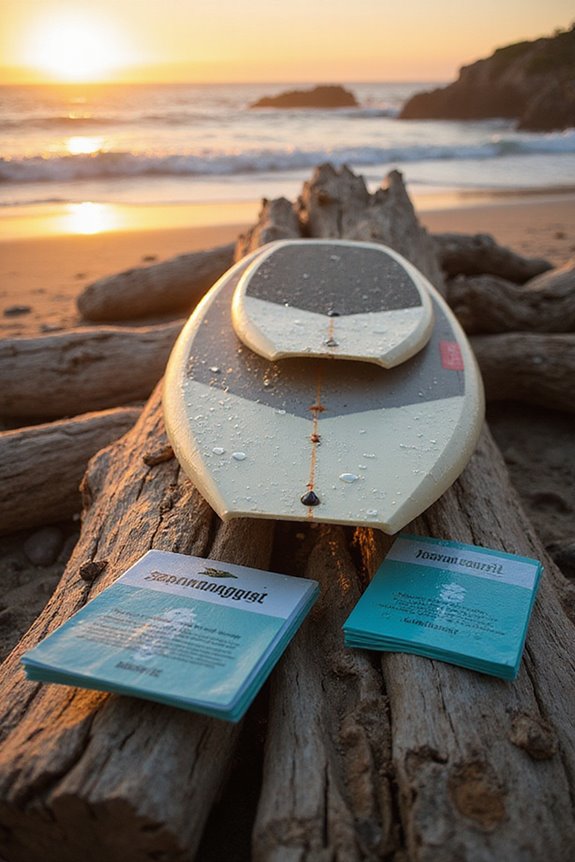
Although surfing anxiety can feel overwhelming, one effective way to manage it is through gradual exposure. This method, often referred to as exposure therapy, involves systematically facing our fears in a controlled manner. By starting with low-intensity experiences, like sitting at the shoreline, we can gradually progress to paddling and riding waves. Research shows that this approach leads to significant anxiety reduction, as our brain learns that the ocean and its conditions aren’t threatening. Additionally, combining exposure with relaxation techniques, such as breath control, can enhance these effects. This structured exposure not only boosts our confidence but also helps develop emotional regulation, making our surfing experience more enjoyable and less stressful. Understanding wave consistency is also crucial as it ensures safer and more manageable conditions during practice.
Mindfulness Techniques for Surfers
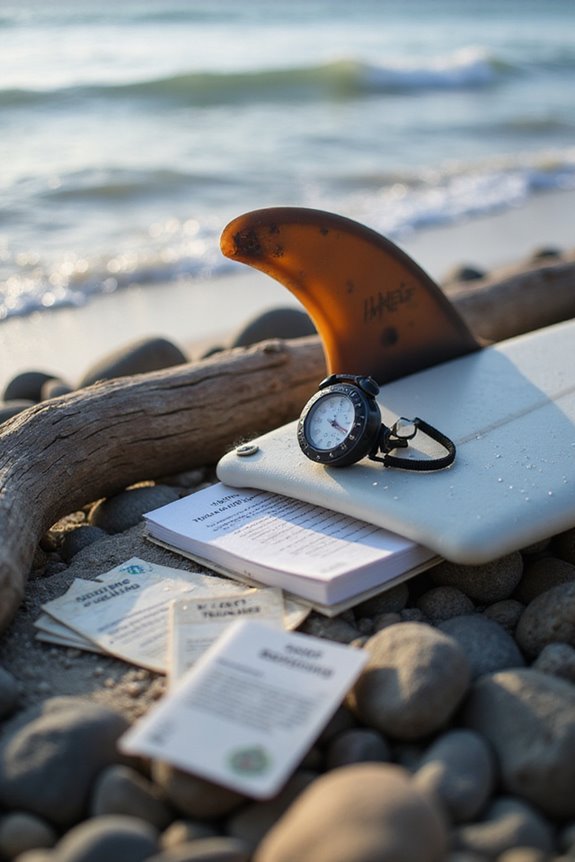
Mindfulness techniques can greatly enhance our surfing experience and manage anxiety. By incorporating breathing exercises, we can focus on deep, controlled breaths, which calm our nervous system and keep us present. This practice helps us reduce distractions and manage anticipatory anxiety.
Mental rehearsal is another powerful tool. When we visualize smooth, confident rides, we prepare our minds for challenging surf conditions, reducing performance anxiety. Combining visualization with breathing enhances relaxation and focus before we enter the water.
Staying anchored in the present moment allows us to fully experience the sensations of the ocean, preventing ruminative thoughts that fuel anxiety. Ultimately, these techniques build resilience and improve our emotional regulation during surf sessions. Additionally, practicing mindfulness meditation can help us observe our anxiety without judgment, further promoting emotional balance while surfing.
Building a Supportive Surf Community
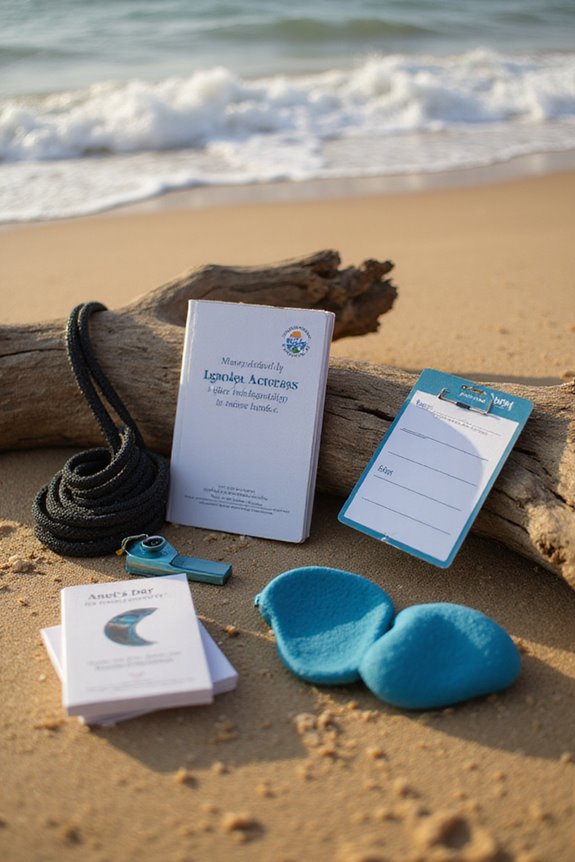
A supportive surf community can considerably enhance our overall surfing experience and mental well-being. Engaging with surf groups, like boardriders clubs or surf therapy programs, fosters strong peer support and community engagement. These groups not only help us build social connections but also provide an environment where we can share our challenges and successes. Additionally, participating in local surf schools, such as Maui Surf School, can connect us with experienced instructors and fellow surfers who share our passion for the waves.
Setting Realistic Goals
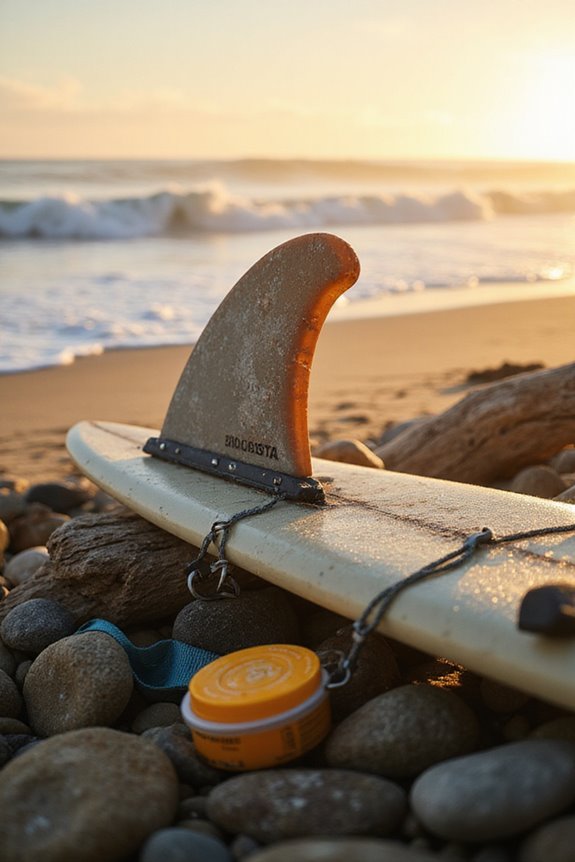
When we set realistic goals for our surfing journey, we create a path that enhances both our skills and confidence. It’s important to establish realistic expectations that align with our current abilities, allowing us to progress comfortably. A well-structured goal breakdown helps us to transform larger objectives into smaller, achievable steps.
- Focus on being “1% better every session” to track incremental improvements.
- Combine short-term milestones with long-term aspirations to stay engaged.
- Create customized goal plans that cater to our personal aspirations and skill levels. Additionally, understanding your personal skill level is crucial for effective board selection and progression in surfing.
Celebrating Small Achievements
Celebrating small achievements is essential in our surfing journey, as it reinforces positive habits and builds confidence over time. Recognizing tiny victories, like successfully paddling out or catching a small wave, creates positive reinforcement loops that enhance our self-belief.
By tracking and acknowledging daily accomplishments, we shift our mindset from fear to possibility. Each small success provides concrete evidence of our capability, reducing rumination on “what if” scenarios.
To enhance our confidence, we can:
- Keep a journal of small victories.
- Set incremental goals to celebrate.
- Share achievements with fellow surfers for additional support.
Engaging with local surf schools can also provide invaluable guidance and support in overcoming anxiety. These practices will help us cultivate resilience against surfing-related anxiety, making our experiences on the water more enjoyable and fulfilling.
Improving Physical Fitness and Ocean Safety
Improving our physical fitness and understanding ocean safety are essential components of our surfing experience. Engaging in aerobic conditioning is important, as paddling constitutes about 50% of our time in the water. This training enhances our endurance and performance during long sessions or competitions.
Strength training also plays an important role in our surfing preparation. Focusing on core and lower body strength helps improve our balance, power, and injury prevention. A structured strength training program can lead to better control on the board and increased stability.
Additionally, understanding ocean conditions—such as currents and tides—enhances our situational safety. By combining fitness improvements with ocean safety knowledge, we can surf more confidently and effectively while reducing anxiety.
Mastery Experiences in Surfing
Often, mastery experiences in surfing play an essential role in reducing anxiety. By successfully overcoming challenges, we enhance our self-efficacy and confidence. Mastery techniques involve important skills like paddling, popping up, and riding waves, which we develop through consistent practice.
As we progress in skill, we navigate various surfing hazards, building our confidence and minimizing fear responses. Early mastery, such as balancing on the board in small waves, is critical for anxiety reduction. Gradual exposure to tougher conditions reinforces our body awareness and presence.
Repeated mastery incidents immerse us in flow states, allowing us to focus fully and diminish anxious thoughts. Ultimately, these experiences foster a sense of freedom and control, counteracting the unpredictability that often triggers anxiety in the ocean.
The Benefits of Nature on Mental Health
When we spend time in nature, we can experience significant improvements in our mental health. Research shows that frequent visits to green spaces lead to lower levels of stress, anxiety, and depression. Engaging with natural environments offers sensory stimulation that helps restore our mental focus and reduces negative thoughts.
The nature benefits include enhanced mood, improved calmness, and better impulse control. Spending time outdoors also promotes mindfulness, which aids in cognitive clarity and reduces worrying thoughts. Additionally, nature exposure has protective effects against mental health disorders, making it an essential aspect of our overall psychological well-being. By prioritizing time in green spaces, we can foster a healthier mind and a more positive outlook on life.
Frequently Asked Questions
How Can I Identify if My Anxiety Is Surf-Related?
We can’t ignore the contrast between the thrill of the waves and the grip of anxiety symptoms. By identifying surf triggers linked to our bodily sensations, we’ll discern whether our anxiety is surf-related or more generalized.
Are There Specific Surf Therapy Programs for Beginners?
Yes, there are specific surf therapy programs designed for beginners. These programs combine surf instruction with mental health support, fostering growth and resilience in a safe environment, perfect for those just starting their surfing journey.
What Equipment Can Help Ease My Surfing Anxiety?
When selecting surfboards, we should prioritize stability to boost our confidence. Also, choosing the right wetsuit for comfort keeps us warm and focused, helping us enjoy our time in the water without unnecessary distractions.
Can I Practice Mindfulness Techniques Outside of Surfing?
Sure, we can totally ignore mindfulness outside surfing, right? But in truth, mindfulness meditation and breathing exercises help us stay present, reducing anxiety and enhancing our emotional well-being, no matter where we are.
How Do Weather Conditions Affect Surfing Anxiety?
We’ve noticed that shifting weather patterns can dramatically influence ocean conditions, affecting our anxiety levels. Calm, predictable days boost our confidence, while rough seas can trigger fear and stress for surfers like us.

